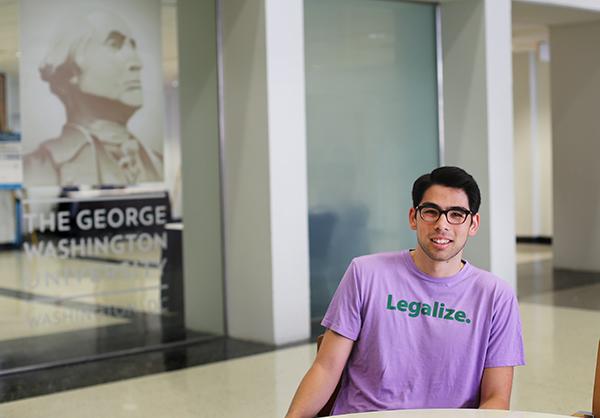Two members of GW’s chapter of Students for Sensible Drug Policy are running for Student Association Senate seats next month so they can push the University for a more lenient drug policy.
Now that the possession and private use of marijuana is legal in D.C., member Charles Spirtos and president Nick Watkins are joining the race with campaigns focused on changing GW’s policies.
“While I have many ideas I want to push forth in the senate, my main focus is drug policy,” said Watkins, who is running for a Columbian College of Arts and Sciences seat.
Watkins said he wants to expand GW’s Good Samaritan and medical amnesty policies, create protections for medical marijuana patients on campus and make policies for alcohol and marijuana the same. He hopes to use schools in other parts of the country as examples to persuade administrators to follow the District’s more progressive rules.
Officials have said that because GW receives millions of dollars in federal funding, it will continue to follow federal law regarding marijuana.
“GW’s policy regarding marijuana possession and use has still not changed, and those caught in violation face punishments ranging from probation to loss of housing,” Watkins said. “Now that the District has legalized, SSDP will work to ease those punishments.”
D.C. officially dropped the ban on marijuana possession for people 21 and older last Thursday after D.C. Mayor Muriel Bowser ignored warnings from Republican members of Congress to not allow the measure to go into effect, the Washington Post reported.
Last week, Bowser sent emergency legislation to the D.C. Council requesting that the city ban restaurants and nightclubs from allowing patrons to smoke marijuana inside their buildings, the Post reported. In January, Congress banned D.C. from using tax money to make laws that regulate the sale of marijuana.
Watkins pointed to schools like the University of Connecticut and Ithaca College, both in states that have decriminalized marijuana, as examples of institutions that have implemented policies to make punishments for alcohol and marijuana equal. Both Watkins and Spirtos also want to focus on student judicial proceedings.
Spirtos, who is running for a seat in the Elliott School of International Affairs, said including other drugs in GW’s Good Samaritan policy – which gives students immunity if they have consumed alcohol and report that another student needs medical attention after drinking too much alcohol – is important “so that students’ lives aren’t put at risk due to harsh disciplinary protocols.”
“[I] will ensure all students are provided with clear and accessible information on campus drug policies, so they accurately know their rights and responsibilities in regards to UPD,” Spirtos said in an email.







